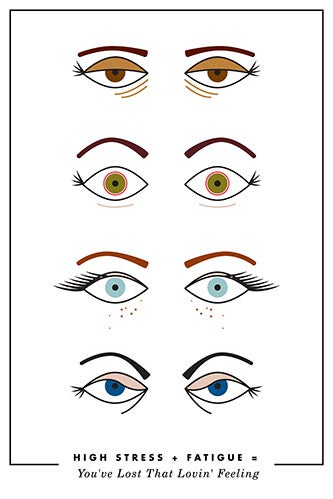
Real women have voracious sexual appetites — or so it would seem, judging by the hot-and-heavy messages currently dominating pop culture. Go behind the societal myth, though, and one in three women say that they’re actually uninterested in sex. And, it’s not just premenopausal women we're talking about; in fact, studies show that they're more sexually driven and sexually active than women aged 18-26. Women of all ages, relationship statuses, and sexual orientations can have low (or missing) libidos.
Is it really a reason to worry? Jill Blakeway, renowned NYC acupuncturist, director of the YinOva Center and author of Sex Again, says it is. "Sex in a long relationship is one of the things keeps us bonded in ways that we don’t necessarily think of," she says. "In Chinese medicine, we say there’s an energetic connection we create when we have sex with someone, and that’s really important to a relationship." So, what’s happening to so many women that causes them to just say “meh” to sexual satisfaction? And what can we do to get our collective groove back?
AdvertisementADVERTISEMENT
Before reaching solutions, it's important to understand the cause. For 70% of Americans with a low sex drive, the problem is due to imbalances in a posse of hormones responsible for sexual desire: cortisol, thyroid, estrogen, DHEA and, testosterone. (Yes, testosterone.) “You want all three of those hormones on your team," says physician, gynecologist and The Hormone Cure author Sara Gottfried. "If you have any of these working against you, you’re screwed. Or, you’re having mercy sex, or you’re not having fun in the bedroom.”
And about that testosterone? Though many think of the hormone as a dude thing, it’s a vital part of a woman’s hormonal makeup as well. (Fun fact: Women have ten times more testosterone than estrogen.)
Testosterone in women is responsible for confidence, setting boundaries, and asking for what you want — vital stuff for maintaining a healthy sexual appetite. So, if testosterone levels (or the levels of any of the aforementioned hormonal "sex drive five") become particularly low, so can your readiness for a romp in the sack.
Like this post? There's more. Get tons of beauty tips, tutorials, and news on the Refinery29 Beauty Facebook page!

Medications, too, can smother your sex drive. Some antidepressants target serotonin, a neurotransmitter connected to pleasure and happiness; while medicines such as Celexa and Prozac can help treat depression, lowered libido is a common side effect. Another counterintuitive player in sex drive deficiency is oral contraceptives. Though the Pill is designed to provide more sexual freedom, it may be holding your sex drive hostage instead, as it’s known to reduce usable testosterone levels in women. And, Gottfried reports, its testosterone-hoarding ways can continue for up to a year after getting off of birth control.
AdvertisementADVERTISEMENT
Hormones alone tend to get the most lip service in the sex drive conversation. But but here’s the rub: Balancing the body and its hormones can’t happen unless the brain is on board, too. Getting your head — not just your body — in the game is just as important in raising libido. Gottfried calls the brain “the biggest sex organ,” one that it’s even bigger than the almighty clitoris (and its impressive 7,000 sensory nerve endings).
You've heard it before, but it's worth repeating: Mind and body balance is key. The Western woman is notoriously over-scheduled, over-busy and overwhelmed. And, since her brain talks to her hormonal system about how stressed, exhausted and unsexy she feels, this feeds right back to hormone imbalances in the body by hijacking levels of cortisol (the stress hormone). “I think of cortisol as the bad-boyfriend hormone,” Gottfried says. “It’s the hormone that you knew was a bad idea or was going to end badly, but you went toward it anyway.”

Debby Herbenick, PhD, a research scientist at Indiana University and author of Sex Made Easy, notes that for many women (and men), hectic lifestyles — such as those that include raising small kids, work-related stress, caring for aging parents and being frustrated with a partner — can lead to a low libido. Though, she offers the following caveat: “These are normal life experiences. Our bodies’ responsibility is to survive and thrive, not necessarily to have loads of desire for sex, sex, and more sex. It's normal — and healthy — for our minds and bodies to take care of ourselves in times of stress, exhaustion, or relationship difficulty.”
AdvertisementADVERTISEMENT
So, how do you know if your low desire is due to a real problem or just a crazy work week? Both Gottfried and Blakeway suggest taking a simple inventory by asking yourself things like, “Do I feel satisfied in my sex life?” and “Does my sex life cause distress for me, my partner, or both?” If you feel something lacking, it's a problem. But, keep in mind: What's troubling for one woman might feel completely right for another. “There are ebbs and flows, peaks and valleys to all relationships and sexual experiences,” Herbenick says. “There is no ‘minimum’ for sex, no set number of sexual experiences per week or month that women and their partners should feel pressured to reach.”
If you do want to boost your sex drive, Herbenick cautions against rushing into certain treatments. “Hormone therapy treatment is not the first step here,” she says, adding that research in the area is inconsistent. Instead, she suggests to first aim for a lifestyle recalibration — one that includes quality sleep, eating well, exercising, and learning to intimately talk with a partner, perhaps with the help of a therapist.
Of course, you may have all of those bases covered and still feel that’s something is missing from your sex life. In that case, a visit to a clinician for blood, saliva or urine tests may uncover hormone imbalances that are causing your lack of sexual appetite. Hormone therapy, herbs or botanicals may be prescribed; Gottfried says that 98% of hormone imbalances can be addressed without a prescription. Or, for instance, the Pill is suspected to be the culprit, your physician may suggest another form of contraception.
AdvertisementADVERTISEMENT

If you don’t have the time, cash (or, say, health insurance) to visit doctors and rack up a grip of tests, you can do plenty to regulate your mental state and lifestyle, which in turn, regulates hormone levels as well. Talk therapy, whether done solo or with a partner, can help address mental roadblocks; getting regular exercise releases neurotransmitters called endorphins, which will give a chemical rush to your sex drive.
And, says Blakeway, tapping into your sensual side is a must. She suggests trying breathing techniques aimed at circulating sexual energy, something that Taoists did 2000 years ago. She also recommends trying a “chocolate mediation” in which you pop a square of cocoa, close your eyes, and notice the sensations and pleasure experienced from that small act.
If chocolate isn’t for you, there are several other ways to move past feelings of fatigue, stress, or inadequacy to arrive at a relaxed, sex-ready state. “It’s about nourishing yourself and being kind to yourself — what Chinese medicine calls nourishing Yin,” Blakeway says. Even thinking about sex can better prime you for sensuality and desire more than attaining a perfect image. (“A good sexual connection isn’t dependent on having a hard body,” she points out.)
Finally, it’s important to stay in touch with your sexual energy, whether you have a sexual partner or not. Gottfried suggests time with “BOB — a battery-operated boyfriend” as a way of exploring your sexuality and keeping in touch with your sexual desires. “It’s not just the 30 or 60-second climatic sneeze; it’s about going deeper with understanding your own anatomy and your capacity as a woman,” she says.
Now you've got all the knowledge you need to bring the fun back to sexytime. And there's no time like the present to give this advice a whirl. So, get a room already, would ya?
AdvertisementADVERTISEMENT






